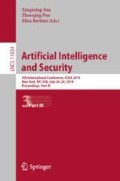Abstract
Based on the Euler quotient modulo 2p (p is an odd prime), we extend the binary sequence with period \(2p^2\) to r-ary sequence where r is an odd prime divisor of \((p-1)\). We determine exact values of the linear complexity of the new sequences under the assumption \(r^{p-1}\not \equiv 1 \pmod {p^2}\), which are larger than half of the period. For cryptographic purpose, the linear complexities of the sequences in this paper are of desired values.
Supported by National Natural Science Foundation of China (61763044).
Access this chapter
Tax calculation will be finalised at checkout
Purchases are for personal use only
References
Chen, Z.: Linear complexity of some binary sequences derived from Fermat quotients. China Commun. 9(2), 105–110 (2012)
Chen, Z.: Trace representation and linear complexity of binary sequences derived from Fermat quotients. Sci. China Inf. Sci. 57(11), 1–10 (2014)
Chen, Z., Du, X.: On the linear complexity of binary threshold sequences derived from Fermat quotients. Des. Codes Cryptogr. 67(3), 317–323 (2013)
Chen, Z., Du, X., Marzouk, R.: Trace representation of pseudorandom binary sequences derived from Euler quotients. Appl. Algebr. Eng. Commun. Comput. 26(6), 555–570 (2015)
Dai, Z., Gong, G., Song, H.: A trace representation of binary Jacobi sequences. Discrete Math. 309(6), 1517–1527 (2009)
Dai, Z., Gong, G., Song, H., Ye, D.: Trace representation and linear complexity of binary \(e\)-th power residue sequences of period \(p\). IEEE Trans. Inf. Theory 57(3), 1530–1547 (2011)
Dai, Z., Gong, G., Song, H., Ye, D.: Trace representation and linear complexity of binary e-th residue sequences. In: International Workshop on Coding and Cryptography-WCC, pp. 121–133 (2003)
Du, X., Klapper, A., Chen, Z.: Linear complexity of pseudorandom sequences generated by Fermat quotients and their generalizations. Inf. Process. Lett. 112, 233–237 (2012)
Du, X., Chen, Z., Hu, L.: Linear complexity of binary sequences derived from Euler quotients with prime-power modulus. Inf. Process. Lett. 112(14–15), 604–609 (2012)
Du, X.: An extension of binary threshold sequences from Fermat quotients. Adv. Math. Commun. 10(4), 745–754 (2016)
Golomb, S., Gong, G.: Signal Design for Good Correlation. Cambridge University Press, Cambridge (2015)
Jungnickel, D.: Finite Fields, Structure and Arithmetics. Biblographiches Institute, Mannheim (1993)
Lidl, R., Niederreiter, H.: Finite Fields. Cambridge University Press, Cambridge (1997)
Massey, J.L.: Shift register synthesis and BCH decoding. IEEE Trans. Inf. Theory 15(1), 122–127 (1969)
Wu, C., Wei, W.: An extension of binary threshold sequences from Fermat quotients. Adv. Math. Commun. 10(4), 743–752 (2016)
Wu, C., Chen, Z., Du, X.: Binary threshold sequences derived from Carmichael quotients with even numbers modulus. IEICE Trans. Fundam. Electron. Commun. Comput. Sci. E95-A(7), 1197–1199 (2012)
Xiong, L., Shi, Y.: On the privacy-preserving outsourcing scheme of reversible data hiding over encrypted image data in cloud computing. CMC: Comput. Mater. Contin. 55(3), 523–539 (2018)
Xu, W., Xiang, S., Sachnev, V.: A cryptograph domain image retrieval method based on Paillier homomorphic block encryption. CMC: Comput. Mater. Contin. 055(2), 285–295 (2018)
Zhang, J., Zhao, C.: Linear complexity and trace representation of sequences with period \(2p^2\). In: IEEE International Symposium on Information Theory, pp. 2206–2210 (2018)
Zhao, L., Du, X., Wu, C.: Trace representation of the sequences derived from polynomial quotient. In: Sun, X., Pan, Z., Bertino, E. (eds.) ICCCS 2018. LNCS, vol. 11066, pp. 26–37. Springer, Cham (2018). https://doi.org/10.1007/978-3-030-00015-8_3
Author information
Authors and Affiliations
Corresponding author
Editor information
Editors and Affiliations
Rights and permissions
Copyright information
© 2019 Springer Nature Switzerland AG
About this paper
Cite this paper
Mohammed, R., Du, X., Li, L. (2019). Linear Complexity of r-ary Sequences Derived from Euler Quotients Modulo 2p. In: Sun, X., Pan, Z., Bertino, E. (eds) Artificial Intelligence and Security. ICAIS 2019. Lecture Notes in Computer Science(), vol 11634. Springer, Cham. https://doi.org/10.1007/978-3-030-24271-8_10
Download citation
DOI: https://doi.org/10.1007/978-3-030-24271-8_10
Published:
Publisher Name: Springer, Cham
Print ISBN: 978-3-030-24270-1
Online ISBN: 978-3-030-24271-8
eBook Packages: Computer ScienceComputer Science (R0)

